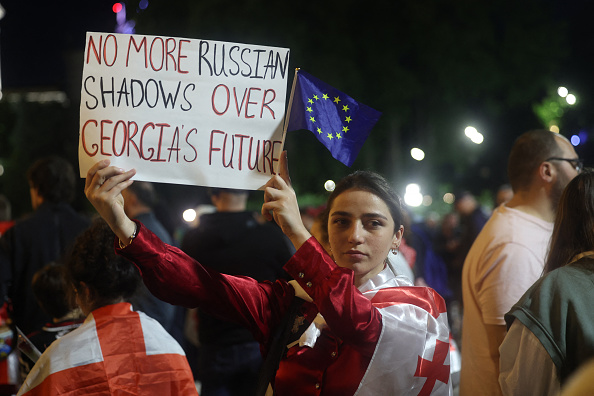Georgia
How a ‘Russian Law’ Brought Georgia to the Brink

SUBSCRIBER+EXCLUSIVE ANALYSIS — In a former Soviet republic, tens of thousands of people take to the streets to protest Russian interference. The Kremlin denies any meddling, and the U.S. says the country faces a choice between Moscow and the West. It’s a narrative familiar to anyone who followed the situation in Ukraine long before Russia’s full-scale invasion in February 2022, but this is the latest news from Georgia, which like Ukraine won its independence from the Soviet Union more than three decades ago.
The spark for the current unrest is a piece of legislation known as the “foreign agents” bill, which would require NGOs and independent media that receive more than 20% of funding from foreign donors to register as organizations “bearing the interests of a foreign power.” Opponents say the measure is the creation of a Russia-backed government, and bears an uncanny resemblance to legislation passed in Russia in 2012 which led to a harsh crackdown on domestic opponents. For many in Georgia, a country that has bristled for decades over Russian influence, the bill is a step too far.
The protests began a month ago, and have grown steadily since. Some 50,000 people took to the streets of the capital, Tbilisi, over the weekend, one of the largest demonstrations Georgia has seen since the collapse of the Soviet Union in 1991. Protestors carried the flags of Georgia, the European Union and Ukraine, and chanted slogans against what they call the “Russian Law.”
On Tuesday, parliament approved the bill, and while President Salome Zourabichvili – an opponent of the government – said she would veto the measure, the presidency is a relatively weak office in Georgia, and the ruling Georgian Dream party has sufficient numbers in parliament to overrule her.
The Georgia showdown is also seen as a fundamental struggle between Russia and the West. Leaders in Europe and the U.S. have joined the bill’s Georgian critics to denounce it as authoritarian and link it to Russia’s broader ambitions.
“We are deeply alarmed about democratic backsliding in Georgia,” White House national security adviser Jake Sullivan wrote on X. Prior to the vote, Sullivan said that “Georgian Parliamentarians face a critical choice – whether to support the Georgian people’s EuroAtlantic aspirations or pass a Kremlin-style foreign agents’ law that runs counter to democratic values.”
The Kremlin has denied any association with the Georgian legislation.
Polls show an overwhelming majority of Georgia’s 3.7 million people lean to the West – keen to join the European Union and the NATO military alliance – and for now they have vowed to keep protesting.
“The government should hear the free people of Georgia,” a young protestor named Nino told Reuters. “We never wanted to be part of Russia,” she said. “And it has always been and always will be our goal to be part of Europe.”
Cipher Brief Managing Editor Tom Nagorski spoke to several experts about the crisis and its implications for Georgia and beyond: a pair of Cipher Brief experts, Ralph Goff and Paul Kolbe, former CIA officers with experience in the region; the Ukrainian scholar and NGO leader Roman Sheremeta; and the Georgian journalist and former Voice of America editor Ia Meurmishvili, who has been reporting on the situation from Tbilisi. Meurmishvili called the crisis “a tipping point on many levels” – for Georgia, for other former Soviet republics, and for the future of democracy in the region.
THE CONTEXT
- The “foreign agent” bill would require nongovernmental organizations and media enterprises that receive over 20% of their funding from abroad to register and provide financial statements about their activities. Failure to do so could result in heavy fines.
- Supporters of the bill say it aims to make foreign funding more transparent and counter foreign influence. They also say it is similar to a U.S. law, the Foreign Agents Registration Act.
- Critics of the bill say it is modeled after a Russian law that the Kremlin has used to snuff out political opposition and civil society. They worry the legislation will be used to silence dissent and free expression.
- The ruling Georgian Dream party drafted the legislation. Georgia’s parliament approved the bill. Georgian President Salome Zourabichvili has vowed to veto it, but parliament can override her objection with a simple majority.
- U.S. Assistant Secretary of State for European and Eurasian Affairs James O’Brien visited Georgia this week and warned that the U.S could impose financial penalties and travel restrictions if the bill is not changed or if security forces violently break up protests.
- Russia invaded Georgia in 2008 and occupied around 20 percent of its territory. Moscow supports the breakaway regions of South Ossetia and Abkhazia.
THE INTERVIEWS
Ia Meurmishvili
Ia Meurmishvili is a former Managing Editor at Voice of America’s Georgian Service, where she hosted the weekly news magazine, “View from Washington.” She is a frequent commentator and moderator in international discussions about U.S. foreign and national security policy, particularly with respect to the Caucasus and Eurasia region.

Roman Sheremeta
Roman Sheremeta, Ph.D., is a chairman of Ukrainian American House, a founding rector of American University Kyiv, and a professor of economics at the Weatherhead School of Management at Case Western Reserve University.

Paul Kolbe
Paul Kolbe is former director of The Intelligence Project at Harvard University’s Belfer Center for Science and International Affairs. Kolbe also led BP’s Global Intelligence and Analysis team supporting threat warning, risk mitigation, and crisis response. Kolbe served 25 years as an operations officer in the CIA, where he was a member of the Senior Intelligence Service, serving in Russia, the Balkans, Indonesia, East Germany, Zimbabwe, and Austria.

Ralph Goff
Ralph F. Goff is a 35 year veteran of the CIA where he was a 6-time “Chief of Station” with extensive service in Europe, the Middle East, and Central and South Asia including several war zones. As a Senior Intelligence Service Executive he was Chief of Operations for Europe and Eurasia responsible for all CIA activities and operations in dozens of countries. Ralph was also Chief of CIA’s National Resources Division, working extensively with “C Suite” level US private sector executives in the financial, banking, and security sectors.
The news from Tbilisi
Meurmishvili: To be honest, the situation is tense. You can feel the tension in conversations in the air every night. Thousands, and in some cases tens of thousands of young people come out in the streets. They basically stay up all night, move from one location to another to make the government hear them and see them, because it seems like the government doesn’t really want to have a conversation with them about this bill and what it means for Georgia’s future. So we’re talking about teenagers, Gen Z mainly. And the older generation as well, who cannot understand why the government is pushing so hard for this bill.
What outrages people and causes this wave of severe opposition is that all the Georgian organizations that have been working, existing, growing since Georgia’s independence in 1991, if they are getting more than 20% of their funding from a foreign source, they will have to register as a foreign agent. What that means is that all these organizations that have tirelessly worked for the past 30 years to put Georgia on this democratic market economy, a European path, the government wants to call them all foreign agents, but these people are patriots. They were working to help their country succeed.
It’s basically a copy, at least in spirit, of the Russian law from 2012 when Putin started exactly with the same premise of transparency. And then he basically closed down and arrested and killed most of the free media, NGOs, anybody who was democratic in Russia. So that’s the concern in Georgia now. That’s causing the outrage.
Sheremata: The bill is very similar in nature to the one that Russia introduced a few years ago, which is a censoring tool for any foreign entity. So let’s say I’m chairman of Ukrainian American House and I’m helping Georgia, then I would be required to go through additional scrutiny of registration. Basically it’s an old-style KGB type of practice that would require any foreign entity or people to be scrutinized by the Georgian authorities, which is a typical thing that Russia does. So the fear is that when this is enacted, it will significantly undermine the whole democracy. And Georgia would be turning into a Russian type of regime.
Kolbe: The Russian fingerprints are all over this. And the Georgian people, being smart, get that. They see it for the threat it is. They understand the nature of how these things work. They understand what a creeping coup looks like.
What we’re seeing in Georgia now is the desire for freedom, the desire for closer ties with Europe, for EU membership, for NATO membership to be part of the West and not part of the “axis of autocracies.”
Goff: It’s a volatile situation, given how out of touch the Georgian Dream-led government appears to be with the Georgian people. Georgians are a fiercely proud people – they are proud of their culture, and especially so of their language, with its own alphabet, which they maintained through 79 years of Russian colonialism during the Soviet era. They are an expressive and emotional people, and this is reflected in how they interact socially and in how they conduct their politics.
Anti-Russian sentiment – a long history
Kolbe: You can’t look at what’s happening today without looking at Georgia in 2008, and in 1991, with the collapse of the Soviet Union. Georgia has had a hard road since the collapse of the Soviet Union, and you always had Russia in there seeing it as their own turf. They fueled and incited the civil wars that took place in the immediate post-Soviet period. They stationed troops there – so-called peacekeepers, but the peacekeepers were really occupiers.
For Russia, the idea of Georgia – somewhat like Ukraine – as independent, free, prosperous and democratic, sitting right on their borders, is very threatening. So they have for decades engaged in deep active measures to destabilize Georgia, to get rid of those politicians and leaders that were not aligned with Russian interests and to promote their own. And you saw this really come to a head in 2008 with the Russian invasion of Georgia.
Meurmishvili: I would say 85, 90% of the population is very negative towards Russia. Russia still occupies 20% of Georgia. There is a historical dimension to this, which is 70 years under the Soviet Union, then 300 years before that under the Russian Empire. So it’s in Georgian society to resist Russia.
But now the war in Ukraine has also exacerbated this issue because about 80% of the Georgians support Ukraine and the government is very silent, and I would say more pro-Russian than pro-Ukrainian. They are not saying that they are pro-Russian, but they have not joined the sanctions. They have not called Russia an invader. They never talk about the possibility of Ukraine’s victory, none of those things that you would expect from a friendly nation to come out. So that’s an additional factor to the anti-Russian sentiments in Georgia – Georgians identify with the Ukrainians now more than anybody, because Russia invaded Georgia in 2008 as well.
Goff: Georgians harbor deep resentments for the Russians, who they view as their tormentors and occupiers responsible for the losses of Abkhazia and Ossetia after short but bloody wars that remain pressure points for Russia to use against Tbilisi.
Sheremeta: Russia attacked Georgia in 2008, when they annexed part of Georgia – exactly what Russia repeated in 2014 with Ukraine. They did the same thing with Georgia in 2008. And then after they took over Georgia, they basically put their police apparatus to work to ensure that Georgia would have a Russian-backed government.
It’s not just Georgia
Kolbe: This is one piece of a long-running, systematic, quite intentional program for Russia to reestablish control over what it calls its “near abroad.” They don’t think of these as foreign countries – they see these nations as former constituent members of the Soviet Union, the collapse of which Putin has called the greatest geopolitical catastrophe of the 20th century. So in Georgia, this is just one piece of legislation, but it fits into the larger pattern of seeking to create environments that are friendly for and accommodating of Russian interests.
Sheremata: The Kremlin is basically trying to keep control of the whole Soviet Union, the former republics. That’s the Russian empire in action, trying to still have control over Ukraine or Georgia or Kazakhstan or other countries. And similar to Ukraine, Georgia has been electing a European path. Ukraine has elected a European path. And so Russia is trying to keep the grip on these countries in order not to let them go, but to have a part of the renewed Russian empire. So the situation in Georgia has a huge geopolitical significance that most people miss. Because if this happens to Georgia, if this happens to Ukraine, I mean which country is going to be next? Is it going to be Kazakhstan? Is it going to be the Baltic countries?
It’s a tipping point, potentially. Russia is trying to get back Georgia as its own. If you remember the “revolution of dignity” in Ukraine (in 2014), that was the tipping point for Ukraine, where Ukrainians basically came out and they said, we don’t want to go back to Russia. And the Russian government, the Russian-backed government, they actually put significant force – military force, police force against people. But it was a tipping point because Ukrainian people did not back down. They continued and they literally threw the government out.
Georgia is pretty much in exactly the same spot right now. And if you look at the protests, you see that people are being pushed to the brink. And so if Georgian people don’t push at this tipping point hard enough, it’s going to be a defeat for them and defeat for democracy overall.
Meurmishvili: It’s a tipping point on many levels. It’s not just Georgia and Georgian democracy and Georgia’s EU membership, it’s also the overall success of a post-Soviet country becoming a democracy.
The way forward
Kolbe: A couple of things to watch for. Do the protests maintain momentum and strength and steam? Do you start to see repressive measures being used, or violence to undermine the protests? I’m sure there’s lots of things being done to undermine the protests and discourage them. And I’ve seen reliable reports of counter protests being organized by the government, but it’s in the usual Russian fashion, busing in state employees from all around the country, the paid protestors and paid counter protestors, and I’m sure there’s many other actions being taken in terms of attempting to intimidate, to co-opt and suppress or repress the movement.
And you want to watch for violence, you want to watch very carefully what’s happening in Abkhazia and Ossetia, whether there’s any rumblings there because that’s an easy way for Russia to stir the pot.
Meurmishvili: We must monitor how this law will impact civil society, election observation missions, anybody who’s supporting Georgia’s democracy in different ways, and if those efforts and entities will be restricted. If they are, then we are entering a completely different phase in Georgia, which is very alien to that country, and very similar to what we have in Belarus, or even in Russia where you ban political parties from participating in the elections, you arrest your political opponents, you have no free media, no watchdog organizations.
We have about five months between now and the October elections. And then we will see how they’re conducted, not on the day of, but also before that – if we see the intimidation tactics, if we will have people arrested, how many political parties will be allowed to participate, and the election process itself.
Goff: It’s worth noting that the Georgians have, in the past, taken up arms when their politics become too divisive, and there is a fair chance they could do so again in reaction to overreach by the Georgian Dream government that subjugates desires for Western integration to Russian models of repression. A scenario involving a bloody popular uprising is not out of question.
Sheremeta: We will see what develops in the coming weeks. But this is pretty scary, to be honest. Knowing Georgian people, having friends from Georgia, knowing where they stand, I don’t think they will allow this government to continue. I honestly think that there will be riots and protests, and a pretty brutal confrontation between police and Georgian people.
The good thing is that Georgia is actually going to have elections in the coming year. But the fear is that through Russian influence and fraud, they can still retain their rule.
Read more expert-driven national security insights, perspective and analysis in The Cipher Brief because National Security is Everyone’s Business.

Georgia
Georgia football star Rodarius Thomas being held without bail after arrest on family violence charges

Rodarius “Rara” Thomas will be away from the Georgia football team for the foreseeable future. The Bulldogs wide receiver was suspended indefinitely after he was booked into jail around 3:20 a.m. Friday, Athens-Clarke County jail records show.
Thomas was arrested on charges of cruelty to children and battery. He is being held without bail.
Thomas’ arrest marks the latest in a string of legal issues involving various members of the powerhouse college football team over the past several months.
This week’s arrest marks Thomas’ second in the past 18 months. University of Georgia Police arrested the wide receiver in January 2023 on a felony charge of false imprisonment and a misdemeanor count of family violence battery.
CLICK HERE FOR MORE SPORTS COVERAGE ON FOXNEWS.COM
Georgia wide receiver Rara Thomas was arrested on charges of cruelty to children and battery early Friday, July 26, 2024, in Athens, Ga., adding to the team’s recent legal woes. (AP Photo/George Walker IV, File)
Those charges were later dropped when Thomas entered a pretrial diversion program. Details about Friday’s arrest were not immediately available.
Georgia Athletic Association spokesperson Steven Drummond said the situation involving Thomas “is a pending legal matter. We will have no further comment at this point.”
TWO GEORGIA FOOTBALL PLAYERS ARRESTED ON BACK-TO-BACK NIGHTS ON RECKLESS DRIVING CHARGES
Georgia football head coach Kirby Smart spoke at Southeastern Conference media days July 16 about attempts to address repeated driving offenses by his players.

A Georgia Bulldogs helmet during the fourth quarter of a game against the Missouri Tigers at Sanford Stadium Nov. 4, 2023, in Athens, Ga. (Todd Kirkland/Getty Images)
Smart said players have been suspended and fined through the collective that provides name, image and likeness (NIL) payments to the school’s athletes. Smart’s policy is to not make public announcements when players are suspended.
“I don’t necessarily think it’s right to go down to the town square and publicly shame kids,” Smart said at SEC media days earlier this month. “When that happens, they go through a lot. And there’s a lot of remorse from these young men who’ve made mistakes. But our job is to educate. Continue to grow these young men.”
A team official confirmed the suspension of Thomas.

Sanford Stadium in Athens, Ga. (Scott Cunningham/Getty Images)
The Bulldogs open the season in Atlanta Aug. 31 in a matchup with the Clemson Tigers.
Georgia players have been involved in 24 driving-related violations (DUI, reckless driving or speeding), The Atlanta-Journal Constitution has reported, including a crash that killed a player and a recruiting staffer in January 2023.
CLICK HERE TO GET THE FOX NEWS APP
Georgia offensive lineman Devin Willock and recruiting analyst Chandler LeCroy were killed in a car crash on Jan. 15, 2023, just days after the Bulldogs won the national title game.
The Associated Press contributed to this report.
Follow Fox News Digital’s sports coverage on X, and subscribe to the Fox News Sports Huddle newsletter.
Georgia
Georgia woman charged with murder after unsupervised 4-year-old boy climbs into car, dies

A Georgia woman is facing murder charges after a 4-year-old boy died inside of a car, authorities say.
On July 24, the Georgia Bureau of Investigation arrestedKelsey Monaco, 30, a Fitzgerald resident, about 154 miles west of Savannah. The Fitzgerald Police Department asked the Georgia Bureau of Investigation to look into the death of the child.
Investigators said the child left his apartment unsupervised and made his way inside of a car.
The 4-year-old was then found unresponsive inside the car. He was taken to a local hospital, where he was pronounced dead, authorities said.
Monaco was taken into custody and booked at the Ben Hill County Jail.
USA TODAY reached out to authorities to find out Monaco’s relationship to the child and if the child died because the car was hot, but we have not heard back.
‘This can’t be real’: He left his daughter alone in a hot car for hours. She died.
Georgia woman charged with murder, investigation ongoing
Monaco is currently in custody at the Ben Hill County Jail.
Arrest records show that Monaco is facing the following charges:
- 1 count, first-degree child cruelty
- 1 count, felony murder
This investigation into the 4-year-old’s death remains active and ongoing. When the investigation is complete, the case will be transferred to the Cordelle Judicial District Attorney’s Office for prosecution, authorities said.
Anyone with information is asked to contact the Fitzgerald Police Department at 229-426-5000 or the GBI Regional Investigative Office in Perry at 478-987-4545. Anonymous tips can be submitted by calling 1-800-597-TIPS (8477), online at https://gbi.georgia.gov/submit-tips-online, or by downloading the See Something, Send Something mobile app.
Ahjané Forbes is a reporter on the National Trending Team at USA TODAY. Ahjané covers breaking news, car recalls, crime, health, lottery and public policy stories. Email her at aforbes@gannett.com. Follow her on Instagram, Threads and X (Twitter) @forbesfineest.
Georgia
CDC officials warning about rising dengue fever cases in Georgia

The Atlanta-based Centers for Disease Control and Prevention are reporting a growing number of cases of dengue fever infections in Georgia.
The agency says the disease is the most common mosquito-borne infection worldwide.
There have been almost 2,900 cases of the viral infection in the United States so far in 2024 – nearly as many as were reported in all of 2023. The CDC says there has also been a record number of cases worldwide.
In Georgia, there have been 20 reported cases – up from 16 earlier in July.
What is dengue?
Spread by mosquitoes, most cases of dengue in the United States are associated with travel to areas like the Virgin Islands, Puerto Rico, or other areas with high risk for tourists.
The CDC says most people never know if they have dengue because of a lack of symptoms.
For the 1 in 4 people who do feel sick after becoming infected, symptoms include fever, headache, skin itching and rash, vomiting, and muscle and joint pains.
In rare cases, people may get severe dengue, a medical emergency that can quickly get worse. Symptoms of this include belly pain, persistent vomiting, a bleeding nose or gums, and vomiting blood.
If you have any symptoms, talk to your doctor and share your recent travel history.
-

 World1 week ago
World1 week agoOne dead after car crashes into restaurant in Paris
-

 Midwest1 week ago
Midwest1 week agoMichigan rep posts video response to Stephen Colbert's joke about his RNC speech: 'Touché'
-

 News1 week ago
News1 week agoVideo: Young Republicans on Why Their Party Isn’t Reaching Gen Z (And What They Can Do About It)
-

 Movie Reviews1 week ago
Movie Reviews1 week agoMovie Review: A new generation drives into the storm in rousing ‘Twisters’
-

 News1 week ago
News1 week agoIn Milwaukee, Black Voters Struggle to Find a Home With Either Party
-

 Politics1 week ago
Politics1 week agoFox News Politics: The Call is Coming from Inside the House
-

 News1 week ago
News1 week agoVideo: J.D. Vance Accepts Vice-Presidential Nomination
-

 World1 week ago
World1 week agoTrump to take RNC stage for first speech since assassination attempt
















